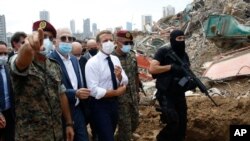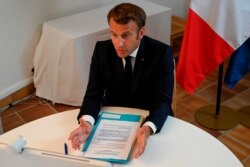French President Emmanuel Macron has earned kudos from many Lebanese and the international community for his proactive response to last week’s explosion in Beirut — praise he doesn’t always hear at home these days. But some critics are raising old accusations of French neocolonialist meddling.
Macron is back in the international spotlight, after making the first visit by a foreign leader last week to blast-crippled Beirut — and co-hosting Sunday’s virtual donors’ conference for the Lebanese, which raised nearly 300 million dollars in humanitarian aid. It’s a position the French president, who has spearheaded similar high-profile events — on climate change, Libya and the Sahel, for instance — seems to relish.
Visiting Beirut — now rocked by massive anti-government protests — Macron was welcomed by residents who called him their only hope. A petition to return Lebanon to French mandate has gathered more than 60,000 signatures.
Its organizers say the Lebanese government — which resigned on Monday — has been totally incapable of securing and managing the country. France said Lebanese aspirations for reforms and governance must be heard.
It’s been a while since Macron got such a hero’s welcome back home, where his approval rating is an underwhelming 39%. In a sign of his difficult presidency, a French newspaper is running a series on the many crises he’s faced, from the yellow vests protests to the coronavirus-crippled economy.
“Macron wants to find a global role. He’s in a very difficult situation in France.”
That’s former French diplomat and geopolitical expert Philippe Moreau Defarges. He said there’s one towering French figure in the backdrop — former World War Two hero-turned-president, Charles de Gaulle.
“He wants to be a new de Gaulle …. he would like to do something for Lebanon.”
Ties between Lebanon and France stretch back centuries. Following World War I Lebanon, as well as Syria, was placed under French mandate. Despite de Gaulle’s reluctance, it achieved independence in 1943.
“Lebanon was a Christian country and there is a very multi-sectoral relation(ship) between France and Lebanon," Defarges said. "There is a connection between France and Lebanon that is beyond colonialism …”
Not all Lebanese — or French — see it that way.
French far right National Rally spokesman Julien Sanchez called Macron’s moves opportunistic. How would French like it, he told French radio, if US President Donald Trump protested with the yellow vests on the Champs Elysees?
Others, including French leftist politicians, claim Macron’s actions reflect a colonial mindset that has never disappeared. “Lebanon is in urgent need of a new pact,” wrote journalist and commentator Ramzy Baroud in Gulf News. “But not one engineered by France.”
France has faced similar accusations before — its Barkhane peacekeeping operation, for example, has sparked protests in Mali and Niger. Macron’s message is only Lebanon can solve Lebanon’s problems — but not everyone believes it.





